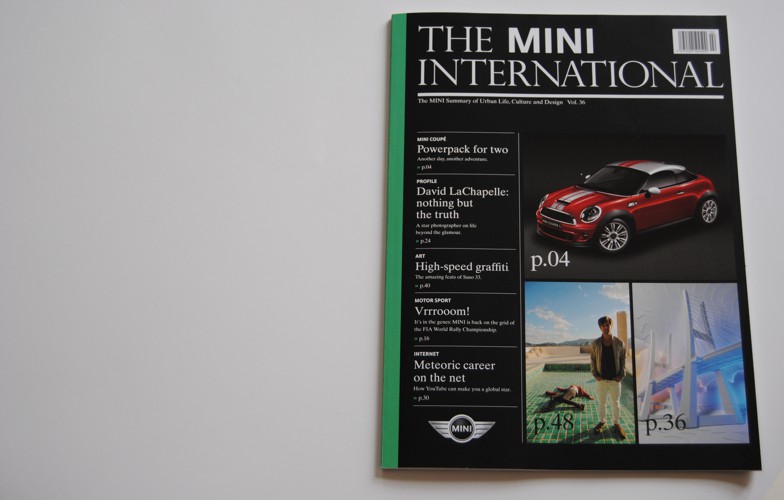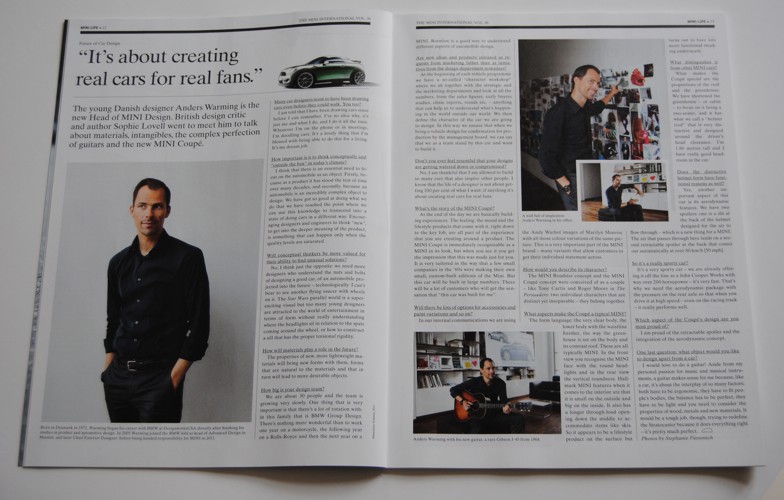The young Danish designer Anders Warming is the new head of design for MINI cars in Munich but he has been a BMW “family” member for years.
Born in the Gentofte region in eastern Denmark in 1972, Warming is a lean, alert and highly focused individual with a sharp intellect and a passion for designing cars that is only matched by his love of making music. He began his career with BMW at Designworks USA in 1997 directly after finishing his studies in product and automotive design in Perugia, Vevey and Pasadena respectively. With Designworks he spent much of his time on the automotive design team in California but also gained experience in the BMW design office in Munich. There followed a brief stint with Volkswagen between 2003 and 2005 but it wasn’t long before Warming returned to the BMW fold as head of Advanced Design in Munich, and later Chief Exterior Designer, before being handed the responsibility for the family’s favourite baby – the Mini – at the beginning of 2011.
The English design critic and author Sophie Lovell went to meet him in Munich to talk about materials, intangibles, the complex perfection of guitars and the new Mini Coupé.
Many car designers seem to have been drawing cars even before they could walk and spend their entire lives as automotive obsessives? Are you one of them?
A I have been told that I was drawing cars since before I can remember. I have no idea why, it’s just me and what I do, and I do it all the time. Whenever I’m on the phone or in meetings, I am constantly doodling cars. Last weekend even I did another car painting – I could have been mowing the lawn but I painted a car instead. It is a lovely thing that I am blessed with being able to do this for a living. It’s my dream job and my hobby – I would even do it for free.
Do you feel there is a necessity to break away from that now and then – to take a step back to reassess your perspective?
I think you have to go through waves as a designer between more factual and then more conceptual thinking. Maybe I needed two years of working in Advanced Design in order to be able to do production cars. Now in my role as head of Mini from a design perspective, I’m much more involved with conceptual and long-term issues.
BMW has been very active in recent years with examining the car industry as a whole from a highly conceptual angle – in rethinking the whole apparatus we know as “car”. Project i and now the Guggenheim Lab are looking at patterns and experimental solutions in design, materials, technology, use and production with individual consultants ranging from the artist Olafur Eliasson to the philosopher Peter Sloterdijk. How important do you think it is for designers, and indeed companies, to think conceptually and “out of the box” in today’s climate?
I think that, as designers, before we all start drawing flying saucers that can change the world there is an essential need to focus on the automobile as an object. Firstly because as a product it has stood the test of time over many decades and secondly because an automobile is an incredibly complex object to design. We sometimes refer to it as “five hundred products in one”. In order to design a car well you have to have certain qualifications in terms of drawing, engineering, craftsmanship and so on. BMW as a group now has the capacity to build really good cars that just get better and better in terms of lightness, aerodynamics and build quality. We have got so good at doing what we do that we have reached the point where we can use this knowledge to transcend into a state of doing cars in a different way. And I don’t mean “different” for the sake of being different – I am talking about a bandwidth of possibility. Encouraging designers and engineers to think “new”, to get into the deeper meaning of the product, as with Project i, is something that can happen only when the quality levels are saturated. You can’t do this if you have a poor quality product…


